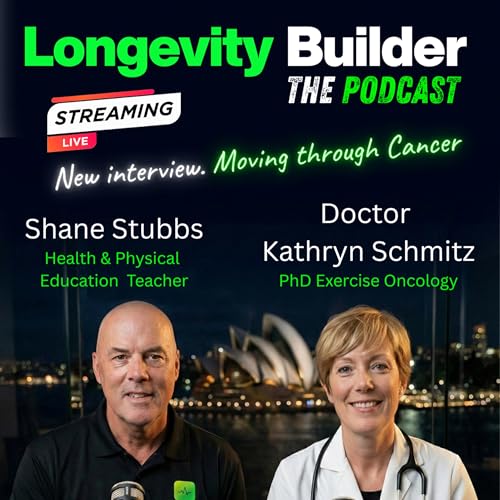Visit https://longevitybuilders.com/to discover book and The Longevity Builder Health Lab.
Episode Summary
For decades, the standard medical advice for cancer patients was simple: "Rest. Take it easy. Avoid exertion." Today’s guest has spent her career proving that advice is not just outdated—it is dangerous.
In this episode, Shane Stubbs sits down with Dr. Kathryn Schmitz, the world’s leading authority in Exercise Oncology. Dr. Schmitz is the scientist who literally wrote the book on moving through cancer. She spearheaded the "Exercise is Medicine" initiative and has led over $30 million in research funding to prove that exercise changes the biology of cancer.
We dive deep into why building a resilient body is your best defense, the specific "Move, Lift, Eat, Sleep, Log" framework, and how resistance training impacts survivorship.
PLUS: Stay tuned until the very end for a "Science Spotlight" Bonus Segment. Shane breaks down new research highlighted by Dr. Rhonda Patrick on "Shear Stress"—explaining the physics of how vigorous exercise can mechanically destroy circulating tumor cells and reverse heart aging by 20 years.
The Paradigm Shift: Why the old advice to "rest" during cancer treatment is being replaced by a prescription for movement.
The Science: Dr. Schmitz’s $30M+ research journey and her role in writing the ACSM guidelines for cancer survivors.
The Protocol: The "Move, Lift, Eat, Sleep, Log" framework for building a body that can withstand the "Big Four" (Cancer, Heart Disease, Metabolic Dysfunction, Neurodegeneration).
Exercise as Medicine: How specific doses of activity can alleviate symptoms, improve chemotherapy tolerance, and boost survival rates.
BONUS Segment: The physics of Shear Stress. We discuss Dr. Rhonda Patrick’s breakdown of how high-intensity blood flow can kill Circulating Tumor Cells (CTCs) and scrub your arteries.
Dr. Kathryn Schmitz is a Distinguished Professor of Public Health Sciences and a Professor of Physical Medicine and Rehabilitation. A trailblazer in the field of Exercise Oncology, she served as the President of the American College of Sports Medicine (ACSM) and founded the Moving Through Cancer initiative.
With a PhD in Exercise Physiology, an MPH in Epidemiology, and over 300 peer-reviewed scientific papers, Dr. Schmitz is the foremost voice on the intersection of movement and malignancy. She is the author of the book Moving Through Cancer.
Book: Moving Through Cancer by Dr. Kathryn Schmitz
Initiative: Moving Through Cancer (ACSM)
Research Spotlight: Dr. Rhonda Patrick on Shear Stress & Circulating Tumor Cells
Ready to put this science into practice? Don’t just listen—execute.Join the Longevity Builder Health Lab to access the protocols, community, and tools you need to build a body that lasts.
📕 GET THE BOOK: The new Longevity Builder Hardcover Book is finally available. It is the manual for longevity mechanics.
👉 Visit LongevityBuilder.com today.
What You Will Learn In This Episode:About The Guest: Dr. Kathryn SchmitzResources & Links MentionedNext Steps: Build Your Body
 1 hr and 5 mins
1 hr and 5 mins 1 hr and 6 mins
1 hr and 6 mins Dec 13 202558 mins
Dec 13 202558 mins 42 mins
42 mins Nov 26 202524 mins
Nov 26 202524 mins 34 mins
34 mins 1 hr and 8 mins
1 hr and 8 mins 1 hr and 15 mins
1 hr and 15 mins
